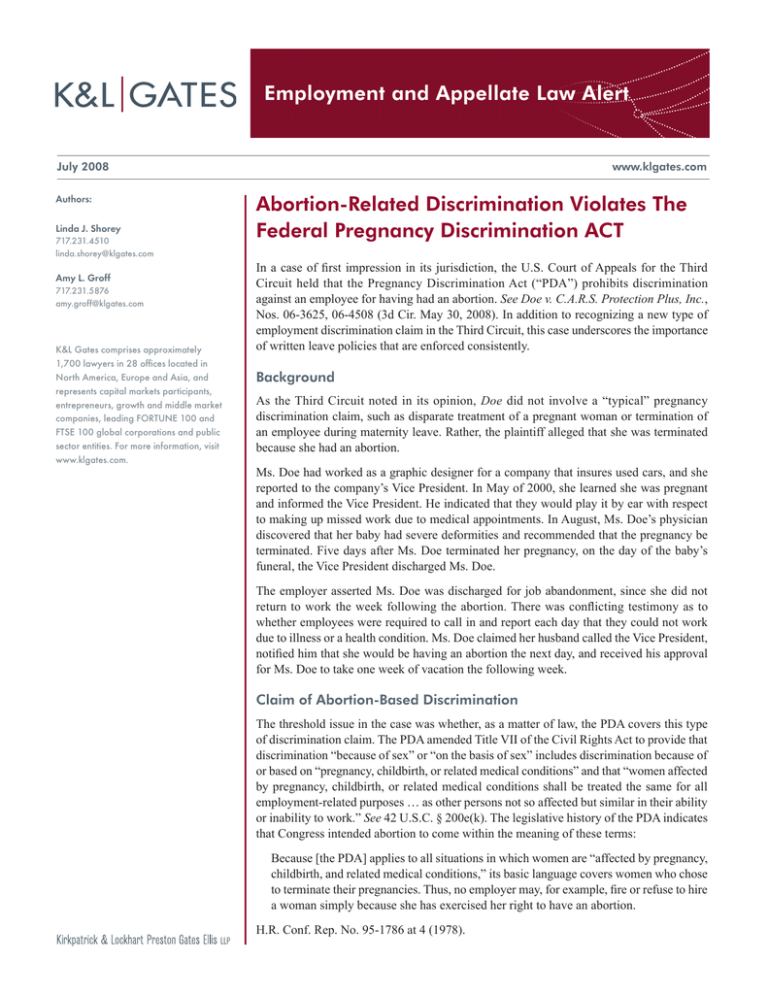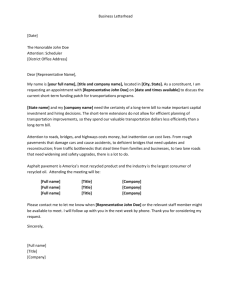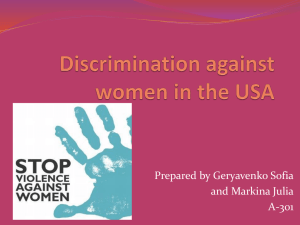
Employment and Appellate Law Alert
July 2008
Authors:
Linda J. Shorey
717.231.4510
linda.shorey@klgates.com
Amy L. Groff
717.231.5876
amy.groff@klgates.com
K&L Gates comprises approximately
1,700 lawyers in 28 offices located in
North America, Europe and Asia, and
represents capital markets participants,
entrepreneurs, growth and middle market
companies, leading FORTUNE 100 and
FTSE 100 global corporations and public
sector entities. For more information, visit
www.klgates.com.
www.klgates.com
Abortion-Related Discrimination Violates The
Federal Pregnancy Discrimination ACT
In a case of first impression in its jurisdiction, the U.S. Court of Appeals for the Third
Circuit held that the Pregnancy Discrimination Act (“PDA”) prohibits discrimination
against an employee for having had an abortion. See Doe v. C.A.R.S. Protection Plus, Inc.,
Nos. 06-3625, 06-4508 (3d Cir. May 30, 2008). In addition to recognizing a new type of
employment discrimination claim in the Third Circuit, this case underscores the importance
of written leave policies that are enforced consistently.
Background
As the Third Circuit noted in its opinion, Doe did not involve a “typical” pregnancy
discrimination claim, such as disparate treatment of a pregnant woman or termination of
an employee during maternity leave. Rather, the plaintiff alleged that she was terminated
because she had an abortion.
Ms. Doe had worked as a graphic designer for a company that insures used cars, and she
reported to the company’s Vice President. In May of 2000, she learned she was pregnant
and informed the Vice President. He indicated that they would play it by ear with respect
to making up missed work due to medical appointments. In August, Ms. Doe’s physician
discovered that her baby had severe deformities and recommended that the pregnancy be
terminated. Five days after Ms. Doe terminated her pregnancy, on the day of the baby’s
funeral, the Vice President discharged Ms. Doe.
The employer asserted Ms. Doe was discharged for job abandonment, since she did not
return to work the week following the abortion. There was conflicting testimony as to
whether employees were required to call in and report each day that they could not work
due to illness or a health condition. Ms. Doe claimed her husband called the Vice President,
notified him that she would be having an abortion the next day, and received his approval
for Ms. Doe to take one week of vacation the following week.
Claim of Abortion-Based Discrimination
The threshold issue in the case was whether, as a matter of law, the PDA covers this type
of discrimination claim. The PDA amended Title VII of the Civil Rights Act to provide that
discrimination “because of sex” or “on the basis of sex” includes discrimination because of
or based on “pregnancy, childbirth, or related medical conditions” and that “women affected
by pregnancy, childbirth, or related medical conditions shall be treated the same for all
employment-related purposes … as other persons not so affected but similar in their ability
or inability to work.” See 42 U.S.C. § 200e(k). The legislative history of the PDA indicates
that Congress intended abortion to come within the meaning of these terms:
Because [the PDA] applies to all situations in which women are “affected by pregnancy,
childbirth, and related medical conditions,” its basic language covers women who chose
to terminate their pregnancies. Thus, no employer may, for example, fire or refuse to hire
a woman simply because she has exercised her right to have an abortion.
H.R. Conf. Rep. No. 95-1786 at 4 (1978).
Employment and Appellate Law Alert
The Equal Employment Opportunity Commission
(“EEOC”), which enforces Title VII, also takes the
position that an abortion is covered by the PDA. See
29 C.F.R. pt. 1604 App. (1986) (“A woman is therefore
protected against such practices as being fired, or
refused a job or promotion, merely because she is
pregnant or has had an abortion.”). The court gave a
“high degree of deference” to the EEOC guidelines
interpreting that section of the PDA. This is a level of
deference that is not given to positions taken by the
EEOC in adjudications or in its Compliance Manual.
See Ledbetter v. The Goodyear Tire & Rubber Co.,
Inc., 127 S. Ct. 2162, 2177 n.11 (2007) (declining to
extend Chevron deference to EEOC’s adjudicatory
position and Compliance Manual).
Based on the plain language of the statute, legislative
history and EEOC guidelines, the Third Circuit held
that the term “related medical condition” includes
an abortion. It is interesting that the court cited both
the plain language of the statute and the legislative
history, as the presumptive rule is that courts are not
to consider legislative history unless the language
of the statute is ambiguous. But it is not atypical for
them to do so. For example, the Sixth Circuit, which
reached the same conclusion as the Third Circuit, also
looked to the PDA’s legislative history even though
it found the language of the statute to be plain. See
Turic v. Holland Hospitality, Inc., 85 F.3d 1211, 1214
(6th Cir. 1996) (relying on plain language of statute,
legislative history and EEOC guidelines to conclude
that employer may not discriminate against employee
because she “exercised right to have an abortion”),
cited in Doe v. C.A.R.S. Protection Plus, Inc., Slip.
Op. at 9. But see Turic, 85 F.3d at 1216 (Batchelder,
J., concurring) (“it is not readily apparent from the
statute that the status of having had an abortion is a
protectable attribute”).
The Third Circuit’s holding is not surprising. The U.S.
Court of Appeals for the Sixth Circuit – the only other
federal appellate court to examine the issue – reached
the same conclusion. And the Third Circuit’s own dicta
in Curay-Cramer v. Ursaline Academy of Wilmington,
Delaware, 450 F.3d 130 (3d Cir. 2006), indicated it was
leaning towards that conclusion.
In Curay-Cramer, an employee who signed a prochoice advertisement in a local newspaper brought
a claim of retaliation under Title VII’s opposition
clause. She alleged she was terminated for publicly
opposing her employer’s practice involving employees
who considered abortions. The court dismissed the
claim after finding that pro-choice advocacy does not
constitute opposition to an illegal employment practice,
but in doing so, cited, with approval, the Sixth Circuit’s
Turic decision and the EEOC’s position.
Summary Judgment
Having concluded that Ms. Doe’s claim was legally
cognizable, the Third Circuit proceeded to review the
grant of summary judgment for the employer based
on the factual record. The court applied the traditional
McDonnell Douglas burden-shifting analysis, under
which an employee must first establish a prima
facie case, the employer must articulate a legitimate
non-discriminatory reason for its decision, and the
employee must then show that the articulated reason
was a pretext for discrimination. The court focused on
the aspect of a prima facie case that requires a nexus
between the pregnancy and the termination.
To establish this nexus, Ms. Doe had put forth evidence
of disparate treatment – i.e., that she was treated less
favorably than similarly situated employees who
were not affected by pregnancy or a related medical
condition. She showed that another employee who
had a heart attack was not required to call in and report
daily while he was in the hospital; an employee who
left work and admitted himself to a psychiatric hospital
was called by the Vice President and told to return
to work or face termination; and the same employee
also went to the emergency room for a hernia and
back problems, missed three days of work, and called
the Vice President only two times. None of these
incidents resulted in termination. The court rejected
the employer’s attempt to distinguish treatment of
these employees on the basis that they reported to
different supervisors because the Vice President
had testified that he alone had discretion to grant or
deny permission to miss work and that all employees
needed his permission to take off sick. In addition, the
Vice President’s secretary testified that there was a
separate set of rules for each employee, that there was
no uniformly enforced rule regarding use of vacation
or sick time, and that there was no rule requiring sick
employees to report to the company each day that they
would miss work due to illness. The court found this
evidence of disparate treatment sufficient to create
July 2008 | 2
Employment and Appellate Law Alert
the inference of discrimination required for a prima
facie case.1
The employer articulated a legitimate, nondiscriminatory reason for its decision – that Ms. Doe’s
employment was terminated because she abandoned
her job by failing to report to work. However, there
was enough evidence from which a jury could infer the
articulated reason was a pretext, and the court reversed
the grant of summary judgment.
Conclusion
From a practical standpoint, this case underscores
the importance of written leave policies that are
enforced consistently and that make employees aware
of notice requirements and consequences for failure
to comply with those requirements. When granting
sick or personal leave, it can be tempting to stray
from policies in an attempt to be sympathetic to an
individual employee’s situation; however, employers
who make decisions on a case-by-case basis do so at
1
their peril. As seen in this case, inconsistencies can
serve as evidence of disparate treatment from which
one could infer discrimination. On the other hand, rigid
adherence to the requirements of a leave policy could
create problems when an exception might be necessary
to accommodate a disabled employee under state or
federal discrimination laws. Decisions involving leave
policies should be weighed carefully and, in many
cases, should involve consultation with legal counsel.
From an appellate review standpoint, this case highlights
the importance of legislative history and agency
interpretation of statutes even where the statutory
language seems clear. Appellate courts will often look
to legislative history and agency interpretation, even
when they believe that the language of a statute is clear,
to bolster their conclusion. And even if an opinion does
not mention legislative history, it can influence the
outcome of a case.
The court also described additional evidence that supported Ms. Doe’s claim. This included a conversation between the Vice President and another employee concerning
coverage of Ms. Doe’s duties while she was off work (which contradicted the Vice
President’s claim that he did not know she would be off the following week); the Vice
President’s disparaging comment that Ms. Doe “didn’t want to take responsibility;” and
the temporal proximity between Ms. Doe’s abortion and the termination of her
employment, which the court found to be “unusually suggestive” of discrimination.
K&L Gates comprises multiple affiliated partnerships: a limited liability partnership with the full name K&L Gates LLP qualified in Delaware and
maintaining offices throughout the U.S., in Berlin, in Beijing (K&L Gates LLP Beijing Representative Office), and in Shanghai (K&L Gates LLP Shanghai
Representative Office); a limited liability partnership (also named K&L Gates LLP) incorporated in England and maintaining our London and Paris
offices; a Taiwan general partnership (K&L Gates) which practices from our Taipei office; and a Hong Kong general partnership (K&L Gates,
Solicitors) which practices from our Hong Kong office. K&L Gates maintains appropriate registrations in the jurisdictions in which its offices are
located. A list of the partners in each entity is available for inspection at any K&L Gates office.
This publication/newsletter is for informational purposes and does not contain or convey legal advice. The information herein should not be used or
relied upon in regard to any particular facts or circumstances without first consulting a lawyer.
Data Protection Act 1998—We may contact you from time to time with information on K&L Gates LLP seminars and with our regular newsletters,
which may be of interest to you. We will not provide your details to any third parties. Please e-mail london@klgates.com if you would prefer not to
receive this information.
©1996-2008 K&L Gates LLP. All Rights Reserved.
July 2008 | 3






